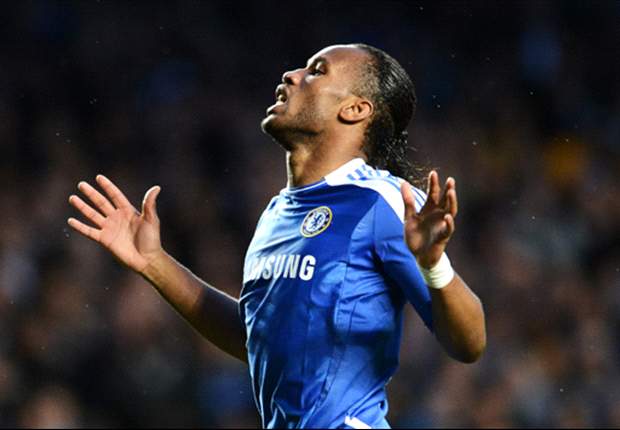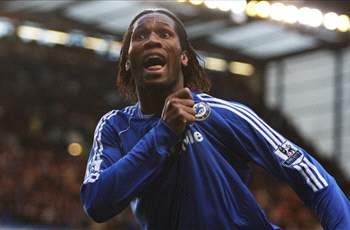 Former team-mates Petr Cech, John Terry and Frank Lampard can all stake strong claims but the Ivorian seized the narrative of the Blues' greatest era for himself
Former team-mates Petr Cech, John Terry and Frank Lampard can all stake strong claims but the Ivorian seized the narrative of the Blues' greatest era for himselfOn that epic Saturday evening in May 2012, as he strode forward to take the final kick of his Chelseacareer against a formidable Manuel Neuer in front of thousands of mortified Bayern Munich fans at the Allianz Arena, Didier Drogba knew that more than the ambitions of a club and the fulfilment of a childhood dream were at stake. His legacy, both in football and in the shirt he was wearing, lay on the line.
The response? "I thought: 'OK - Panenka'," the Ivorian revealed to Sportmasta in an interview for the edition of 'Sports Life Stories' which centred on him.
It is tempting to wonder how differently Drogba's Chelsea epitaph would read had he gone ahead and failed - or even succeeded - in executing the most nonchalant penalty technique in the book at one of the most pivotal junctures in the club's history. Would he be cheered or vilified when stepping out into his old home as a Galatasaray player on Tuesday?
| KING DIDIER | |
 | |
| DROGBA'S CHELSEA CAREER STATS | |
| GAMES PLAYED GOALS PREMIER LEAGUES WON FA CUPS WON LEAGUE CUPS WON CHAMPIONS LEAGUES WON | 341 157 3 4 2 1 |
Even at its most spectacular, Drogba's genius never resided too far from madness. His wild audacity on the field could stray readily into folly, with his effectiveness occasionally undermined by indiscipline, selfishness or lethargy. Yet whenever these flaws threatened to jeopardise the happy ending to his Chelsea story, timely brilliance invariably delivered him.
His first two seasons at Stamford Bridge bore few hallmarks of a love affair, yielding just 32 goals in all competitions even as Jose Mourinho's men swept all before them in England. Injuries disrupted his rhythm but a £24 million price tag, combined with an over-indulged penchant for diving and histrionics, ensured that he received little sympathy.
Roman Abramovich, similarly underwhelmed, smashed Chelsea's transfer record to bring Andriy Shevchenko to Stamford Bridge in the summer of 2006. Drogba responded by exploding, scoring 33 goals in all competitions and winning the first of two Premier League golden boot awards. Shevchenko played second fiddle for two years before returning to AC Milan on loan. He would not be the last big-name rival to be devoured by the Ivorian's talent and force of personality.
Under Mourinho, Drogba blossomed into the finest target man of the modern era. The diving did not stop but was instead employed at sensible times and with less fanfare. Meanwhile, refining his immense physical gifts to bully entire defences, he improved his composure in front of goal, his crossing, his left foot and his link-up play outside the penalty area. Eventually it was difficult to spot a weakness.
Ahead of his much-anticipated return to Stamford Bridge, watching back Drogba's 100 Premier League goals is exhilarating and not simply because it provides an emphatic reminder of the peerless power which coursed through his game; equally startling is the variety on show. There are towering headers, flashing volleys, clinical finishes, poacher's strikes and long-range screamers with the left foot and the right, as well as dipping free kicks and four penalties. This was a battering ram, certainly, but a battering ram with a brain.
His standing reached its lowest ebb with the petulant slap on Nemanja Vidic which brought a red card in the closing stages of the 2008 Champions League final in Moscow. The subsequent revelation that he took to the field in the knowledge that his grandmother was gravely ill - she died a month later - provided an explanation rather than an excuse for an act which condemned captain John Terry to taking Chelsea's fateful fifth penalty in a dramatic shootout defeat to Manchester United.
But more often Blues fans were one with Drogba as he, more than any other player, lived the club's tortuous rollercoaster ride in the Champions League: semi-final heartache against Liverpool, ignominy in Moscow, incredulous rage at Tom Henning Ovrebo, soul-searching after deserved beatings by Inter and United and, finally, miraculous redemption in Munich. It seemed fitting that, having defined the journey, he should bid farewell once the destination was reached.
Of course, there can be no doubt that the romance of Drogba's final moments in a Chelsea shirt have conditioned judgements on his legacy. In a poll conducted less than three months after the Champions League triumph, a vast majority of 20,000 readers of Chelsea Magazine voted the striker the club's greatest ever player. Within such a context, how could they not?
The reality is not quite so clear-cut. Petr Cech is the greatest goalkeeper that Chelsea have ever had, although men of his position do not generally enjoy a status which transcends it. John Terry is the club's greatest captain, even if he has not always been its greatest ambassador. Frank Lampard is the club's all-time top goalscorer and has superior longevity and consistency over his outfield rivals. Peter Osgood has regularly topped best-Blues polls in the past - along with the likes of Kerry Dixon and Gianfranco Zola, he is one of several strikers to have passed into the club's legend.
But Drogba owns the narrative of Chelsea's greatest era. The ultimate big-game match-winner, he seized it for himself with nine goals in nine cup finals, including an equaliser and winning penalty in the most important one of all. The morning after Munich, commanding the microphone on the team's open-topped bus like a rockstar on tour, he addressed the assembled thousands in blue as "my people".
When he steps out onto the Stamford Bridge pitch again on Tuesday evening, it will be hard to avoid the conclusion that they always will be.
No comments:
Post a Comment